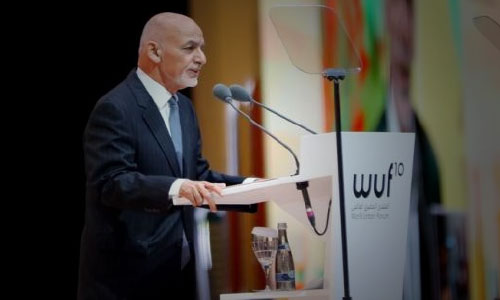KABUL - The fourth industrial revolution is disrupting the definition of urban well-being and human prosperity, says President Ashraf Ghani.
Addressing the 10th session of the World Urban Forum in Abu Dhabi, the president called for compact and sustainable cities between now and 2050.
Urgent, systematic and global action was needed in a fast-changing global context, he said, stressing the need for dealing with the environmental change,
The earth would become two degrees warmer by 2050, turning current urban planning assumptions regarding energy, transport and water on their head, he added.
The fifth wave of global violence changes posed unprecedented risk to urban security, public spaces and freedom of association and travel, the president continued
Ghani noted the re-emergence of big power rivalry could trigger uncertainty at a time when cooperation at the regional and global level was most needed.
He said the silver lining was the availability of tools and techniques to resolve problems.
He also stressed a nuanced approach to culture -- a universe of agreement and disagreement embodied in implicit rules of the game and explicit governing codes.
“Cultures of communities of knowledge, expertise, pose the most significant constraint. What has worked in the last 60 years is not going to work in the next 30 years.”
He asked organisations like UN-Habitat to embrace a cultural change. The culture of most firms had been on unsustainable paths and providing the wrong advice, he deplored.
Global entities like the IMF and the World Bank, with assumptions that are still reflective of a different world,
The first challenge in turning to innovation is to move from the culture of urban planning to design-thinking, according to the president.
“When we talk about planning, we think we have the solutions. When we think about the designs, we forge the solutions together and take account of the changing context from the energy, the wasteful energy, and wasteful water treatments or transport that is directed towards elites rather than masses.”
The second aspect of innovation was to harness collective intelligence, he said, adding modern technology and ancient ways of consultation had facilitated thinking about collective intelligence as a form of solution to problems, Ghani continued.
“Thirdly, hierarchy and participation must be balanced. If top-down and bottom-up solutions are not simultaneously engaged in, we are going to be constantly experimenting which is necessary, but a culture of participation and ensuring the ground, but also not analysis leading to paralysis, is important.
“In order to move forward, we need to shape the rules of the game rather than to make them so restricted that possibilities of future development are foreclosed...
“My last remarks are about leadership and management. Leadership in today’s context is first and foremost to deal with uncertainty and be able to respond to constant change in context, yet have the sense of the medium-term and the long-term…We need to be prepared for multiple scenarios and take stock of changing context and yet pursue goals.”
The Afghans, having suffered 40 years of an unwanted conflict, were embarking on a creative urban dialogue, said the president, who spoke last month to 22 districts of the Kabul city and 14 surrounding it. (Pajhwok)
Home » Afghanistan » Ghani Suggests Compact, Sustainable Cities
Ghani Suggests Compact, Sustainable Cities

